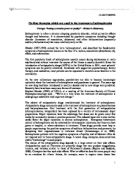He knew he had an incurable disease, which was likely to kill him in a few years. Not knowing what was going to happen to him, or how rapidly the disease would progress, he was at a dead end. The doctors told him to go back to Cambridge and carry on with the research about general relativity and cosmology. Stephen was not making much progress, because he didn't have much mathematical background. His dreams at that time were rather uneasy. Before his condition had been diagnosed he thought life was boring until that he was enjoying life in the present more than past. He began to make progress with his research, and he got engaged to a girl called Jane Wilde, who he met just about the time his condition was diagnosed. The engagement changed his life. It made him feel he was worth living. But it also meant that he had to get a job if we were to get married. So he applied for a research fellowship at Gonville and Caius College, Cambridge. Stephen got a fellowship to Cauis, and he got married a few months later.
The fellowship at Caius took care of his immediate employment problem. He worked in theoretical physics, because that was one of the few areas in which his condition would not be a serious handicap. And he was fortunate that his scientific reputation increased, at the same time that his disability got worse.
Jane and Stephen owned may flat houses. As Stephens condition got worse they got a flat house with large rooms and wide doors. He said it was also nice for his three children, because it was surrounded by garden, which was looked after by the College gardeners.
Up to 1974, Stephen was able to feed himself, and get in and out of bed. Jane managed to help him, and bring up the children, without outside help. However, things were getting more difficult, so they took one of his research students to living with them. In 1980, they changed to a system of community and private nurses, who came in for an hour or two in the morning and evening. This lasted until he caught pneumonia in 1985. He had to have a tracheotomy operation. After that, he had to have 24 hour nursing care. This was made possible by grants from several foundations.
Before the operation, his speech had been getting worse, so only a few people, who knew him well, could understand him. He wrote scientific papers read by a secretary, and he gave seminars through an interpreter, who repeated his words more clearly. However, the tracheotomy operation removed his ability to speak. For a time, the only way he could communicate was to spell out words letter by letter. However, a computer expert in California, called Walt Woltosz, heard of his difficulty. He sent him a computer program he had written, called Equalizer. This allowed him to select words from a series of menus on the screen, by pressing a switch in his hand. The program could also be controlled by a switch, operated by head or eye movement. When he had built up what he wanted to say, he can send it to a speech synthesizer. David Mason, of Cambridge Adaptive Communication, fitted a small portable computer and a speech synthesizer to his wheel chair. This system allowed him to communicate much better and he can manage to say up to 15 words a minute. By this system, he had written a book, and dozens of scientific papers. He had also given many scientific and popular talks. They have all been well received. He says that “One’s voice is very important”.
He had motor neuron disease for practically all his adult life. Yet it has not prevented him from being successful in work. He thanks Jane, his children, and a large number of organizations. Professor Hawking has twelve honorary degrees, was awarded the CBE in 1982, and was made a Companion of Honor in 1989. He is the recipient of many awards, medals and prizes and is a Fellow of The Royal Society and a Member of the US National Academy of Sciences. It is also known that Stephen Hawking is one of the smartest people on earth.
Stephen Hawking continues to combine his family and his research into theoretical physics together with a general programmer of travel and public lectures.







